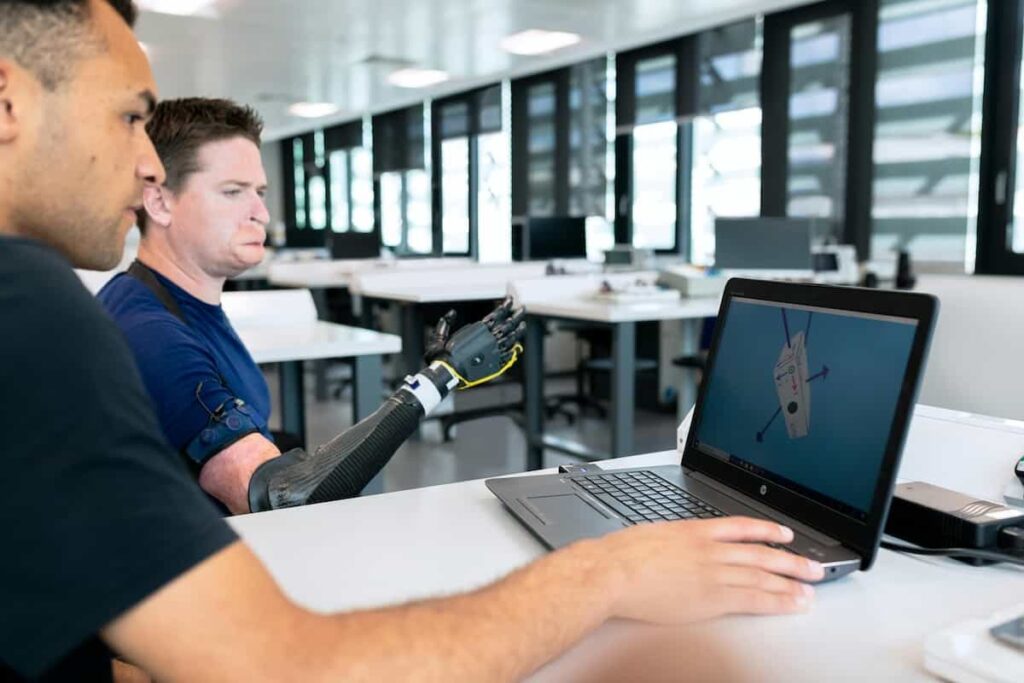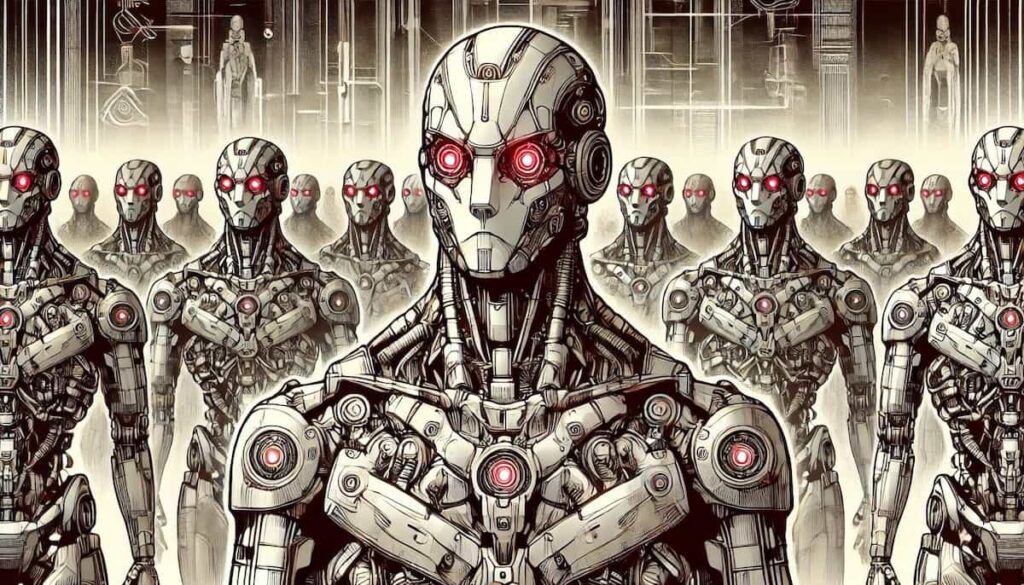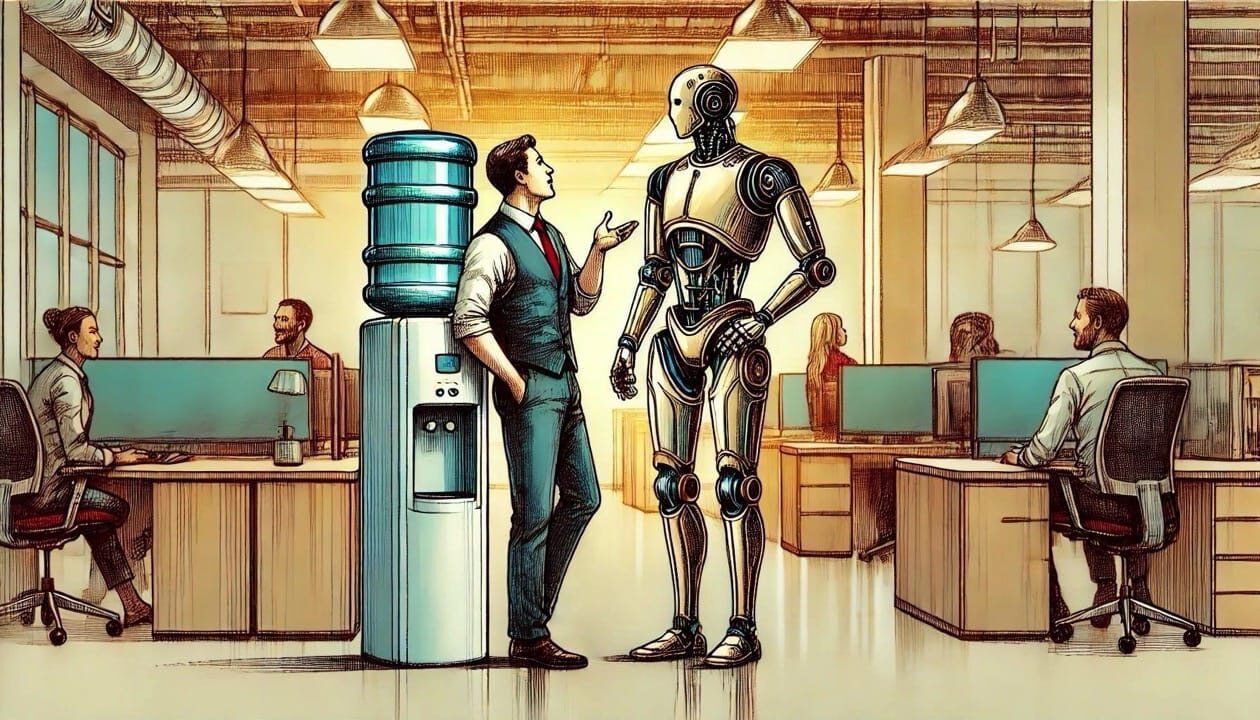The rise of AI jobs has sparked a mix of excitement and fear. As artificial intelligence advances, many workers wonder: Will AI replace jobs entirely, or will it create new opportunities? While automation is changing industries, the truth is more nuanced. AI jobs are rapidly growing, but that doesn’t mean human workers will become obsolete. Instead, AI is transforming the workplace—eliminating some roles while generating entirely new ones.
Will AI Replace Jobs? The Truth About Automation
Throughout history, technological advancements have both displaced and created jobs, leading to significant shifts in the labor market. Understanding these patterns provides valuable insights into how current and future technologies, like artificial intelligence (AI), might influence employment.
The fear that AI will take over human labor isn’t new. Every industrial revolution introduced disruptive technologies that replaced certain jobs while creating new industries. The same applies to AI jobs today.
Historical Examples of Job Displacement and Creation
- Weavers and the Industrial Revolution: The invention of the spinning jenny and mechanized looms in the 18th century revolutionized textile production. While these machines increased efficiency, they rendered many artisan weavers’ skills obsolete, leading to job losses. However, this technological shift also spurred the growth of factories, creating new jobs in machine operation, maintenance, and supervision.
- Elevator Operators: In the mid-20th century, elevators required operators to manually control them. The advent of automated elevators eliminated these positions. Concurrently, the construction of taller buildings, facilitated by elevator automation, led to increased demand for roles in building maintenance, security, and management.
- Typesetters and Desktop Publishing: Before digital publishing, typesetters manually arranged text for printing presses. The introduction of desktop publishing software in the 1980s and 1990s made this role redundant. However, it democratized publishing, leading to a surge in graphic design, digital marketing, and content creation jobs.
Modern Day Examples of Job Loss and Creation
- Bank Tellers and Online Banking: The rise of online banking, automated teller machines (ATMs), and mobile payment systems has reduced the need for traditional bank tellers. This shift has led to new jobs in fintech development, cybersecurity, and digital customer support.
- Manufacturing Workers and Automation: The integration of robotics and automation in manufacturing has decreased the demand for manual labor in production lines. Conversely, it has generated jobs in robot maintenance, programming, and system oversight.
- Retail Cashiers and Self-Checkout Systems: The implementation of self-checkout kiosks in retail stores has reduced the number of cashier positions. This technology has created roles in kiosk manufacturing, software development, and technical support.
- Customer Service Representatives and Chatbots: AI-driven chatbots have taken over routine customer inquiries, reducing the need for human customer service agents. This development has led to opportunities in chatbot design, natural language processing, and AI training.
The rise of AI has ignited discussions about its potential effects on the job market:
- Scope of AI Disruption: A report by Brookings Institution indicates that over 30% of US workers could see at least half of their tasks impacted by generative AI, particularly in higher-paid professions.
- Job Creation Potential: Despite concerns about job losses, AI is also expected to create new roles. According to a McKinsey report, while certain jobs may decline, AI could lead to the emergence of new occupations, especially those involving the development, oversight, and maintenance of AI systems.
- Shift in Skill Requirements: Experts suggest that AI will handle more repetitive tasks, increasing the value of roles requiring judgment, decision-making, creativity, and emotional intelligence. This shift emphasizes the need for workers to adapt by acquiring new skills that complement AI capabilities.
Jobs at Risk: AI is exceptionally good at automating repetitive, rule-based tasks. Fields like data entry, customer service, and even some journalism roles are already being impacted by AI-driven automation. Companies investing in AI jobs are looking for efficiency, which means some traditional roles may disappear.
Jobs AI Creates: The demand for AI jobs has skyrocketed. Businesses need AI engineers, data scientists, prompt engineers, and machine learning specialists to build, train, and maintain AI systems. Additionally, AI is enhancing fields like medicine, finance, and cybersecurity, creating opportunities for workers who are willing to adapt.
The key takeaway? While AI will replace some jobs, the growth of AI jobs means humans can shift into roles where creativity, strategy, and emotional intelligence are key.
In summary, while AI and other technological advancements may displace certain jobs, they also have the potential to create new opportunities. The net effect on employment will largely depend on how societies adapt to these changes, including the emphasis placed on education, reskilling, and the development of roles that leverage uniquely human skills.
Which Jobs Are Safe vs At Risk?
The rapid advancement of artificial intelligence (AI) has sparked extensive discussions about which jobs are susceptible to automation and which remain secure. Understanding the distinction between at-risk and safe occupations is crucial for workforce planning and individual career choices.
Jobs at Risk of AI Automation

Occupations characterized by repetitive, routine tasks are particularly vulnerable to AI-driven automation. Notable examples include:
- Data Entry Clerks: AI’s proficiency in handling vast amounts of data swiftly and accurately threatens roles centered on data processing.
- Customer Service Representatives: The deployment of AI-powered chatbots and virtual assistants is reducing the demand for human agents in handling standard inquiries.
- Manufacturing and Assembly Line Workers: The integration of robotics in manufacturing processes is diminishing the need for manual labor in production lines.
- Translators and Interpreters: Advancements in AI translation tools are impacting professionals in this field, leading to a decline in traditional translation requests.
Jobs Considered Safe from AI Automation

Conversely, professions that require human-centric skills are less susceptible to automation. These include:
- Healthcare Professionals: Roles such as nurses, doctors, and therapists necessitate emotional intelligence and complex decision-making, areas where AI currently falls short.
- Creative Professionals: Occupations involving creativity, such as artists, writers, and musicians, rely on human experience and emotional depth, making them less prone to automation.
- Skilled Trades: Jobs like electricians, plumbers, and carpenters require hands-on skills and adaptability to unpredictable environments, which are challenging for AI to replicate.
Experts emphasize that while AI can automate specific tasks, it also complements human roles by enhancing productivity. For instance, AI tools assist professionals in various fields, allowing them to focus on more complex aspects of their jobs.
Can AI Become Self-Aware?

The fear that AI could become self-aware and replace humans has long been a topic of science fiction, but how close is this to reality? While AI jobs are transforming industries, the idea of self-aware AI remains far from achievable based on current technology.
What Does Self-Awareness Mean?
For an AI to be truly self-aware, it would need to:
- Understand its existence and differentiate itself from the world around it.
- Have subjective experiences such as emotions, desires, and independent reasoning.
- Demonstrate consciousness, which even neuroscientists struggle to define in humans.
Current AI, including the most advanced models powering AI jobs, does not meet these criteria. Instead, AI operates as a pattern-matching and prediction tool that processes vast amounts of data but does not think independently.
The debate around AI consciousness has led many experts to weigh in on whether artificial intelligence will ever achieve true self-awareness. While AI continues to evolve rapidly, researchers agree that self-aware AI is not within our current reach—and may never be.
Dr. Stuart Russell, a leading AI researcher and professor of computer science at the University of California, Berkeley, asserts that while AI can simulate human-like behavior, it does not possess true awareness. In an interview with MIT Technology Review, he explained: “AI can simulate human-like behavior, but true self-awareness is not something we are anywhere near achieving.” AI models today function through pattern recognition, data analysis, and probabilistic decision-making, rather than actual cognitive thought. This means AI can appear intelligent, but it does not possess independent reasoning, emotions, or self-reflection—the key components of self-awareness.
Similarly, Dr. Geoffrey Hinton, a Turing Award-winning researcher often referred to as the “Godfather of AI,” has emphasized that the capabilities of AI have been overestimated when it comes to consciousness. While he has warned about AI’s potential dangers, he has also clarified that AI jobs today are built around automation, not sentience. AI’s primary function in industries such as healthcare, finance, and customer service is to optimize processes, analyze large datasets, and enhance efficiency. No current AI system is even remotely close to developing independent thoughts or subjective experiences.
The Future of Life Institute, a prominent research organization focused on the risks of artificial intelligence, echoes this sentiment. Their experts argue that the biggest risks associated with AI are not about AI “waking up” but rather how humans choose to use it. In a widely cited report, the institute stated: “Conscious AI is an unfounded fear. The real concern is how humans use AI, not whether AI will ‘wake up.'” This highlights the urgent need to prioritize AI ethics, transparency, and responsible implementation, rather than worrying about AI suddenly developing self-awareness.
In summary, the consensus among AI experts is that self-aware AI is not a current or foreseeable reality. AI can be programmed to mimic intelligent behaviors, but it lacks the intrinsic qualities that define consciousness. The real discussion, therefore, should shift away from the fear of AI becoming self-aware and toward the ethical and practical challenges AI already presents in fields such as misinformation, bias, and automation.
Why AI Won’t Become Self-Aware Anytime Soon
Although AI is advancing rapidly, even the most sophisticated AI jobs rely on predefined data and algorithms. Unlike humans, AI lacks personal experiences, emotions, or intuition. It can predict and generate responses, but it does not understand or feel anything.
The reality? AI will continue to enhance AI jobs, automate tasks, and make predictions—but it will not develop independent thought or consciousness.
The Real AI Risk: Misinformation & Human Misuse
While self-aware AI is not a real threat, the misuse of AI is already a major issue. The biggest risk isn’t AI replacing AI jobs, but rather how AI is used to spread misinformation, manipulate public opinion, and automate harmful tasks.
AI-Driven Misinformation

The rise of AI-generated content has made it increasingly difficult to differentiate real information from fake. Deepfake videos, AI-written articles, and manipulated images are already being used to:
- Influence Elections: AI-generated fake news articles and social media bots manipulate public discourse.
- Damage Reputations: AI can create deepfake videos impersonating public figures, leading to misinformation.
- Scam and Defraud: AI-powered phishing scams are more convincing than ever, putting personal data at risk.
According to a World Economic Forum report, AI-powered misinformation is now considered one of the biggest threats to global stability.
Human Misuse of AI

Beyond misinformation, AI is being deliberately misused for harmful purposes. Some key concerns include:
🚨 Bias in AI Jobs & Hiring: AI-driven hiring tools can unintentionally discriminate against candidates based on race, gender, or socioeconomic background. Without oversight, AI can reinforce human biases rather than eliminate them.
🚨 Surveillance & Privacy Risks: Governments and corporations use AI-powered surveillance tools that track and analyze behavior, often without consent. This raises ethical concerns about mass surveillance.
🚨 Autonomous Weapons: AI is being integrated into military systems, raising fears that automated weapons could make life-and-death decisions without human intervention.
🚨 Cybercrime & AI-Powered Hacking: AI is being used to develop sophisticated cyberattacks, making it easier for hackers to breach systems, steal identities, and disrupt businesses.
Protecting Against AI Misuse
Since AI jobs are becoming more integrated into our lives, the responsibility to prevent misuse falls on governments, businesses, and individuals. Here’s how we can mitigate AI-related risks:
✅ Regulations & Oversight: Governments should enforce AI ethics standards to prevent biased AI hiring practices and AI-driven misinformation.
✅ AI Literacy & Public Awareness: Educating people about AI-generated misinformation can reduce susceptibility to fake news.
✅ AI Ethics in AI Jobs: Companies hiring for AI jobs must prioritize responsible AI development, ensuring that AI is used for good rather than exploitation.
✅ Technological Countermeasures: AI itself can be used to detect and flag AI-generated misinformation, making it harder for deepfakes to spread unchecked.
How to Protect Your Job from AI
As artificial intelligence continues to reshape industries, many workers are asking: How can I future-proof my career in an AI-driven world? While AI automation is replacing certain tasks, it is also creating new opportunities. The key to staying relevant in the job market is adaptability, upskilling, and leveraging uniquely human skills that AI cannot easily replicate.
1. Develop AI Literacy & Understand How AI Works
One of the best ways to protect your job is to understand AI rather than fear it. AI is already integrated into many industries, from healthcare to finance, and professionals who know how to work alongside AI will have a significant advantage.
- Learn how AI is used in your industry.
- Take online courses on AI fundamentals (Coursera, Udacity, or edX offer AI literacy programs).
- Understand automation trends so you can anticipate changes before they happen.
Being AI-literate makes you more valuable to employers, as businesses increasingly seek employees who can collaborate with AI tools rather than be replaced by them.
2. Focus on Skills AI Can’t Easily Replace
AI is excellent at handling repetitive, data-driven tasks, but it struggles with creativity, emotional intelligence, and human interaction. By strengthening these skills, you can ensure your role remains relevant:
✅ Critical Thinking & Problem-Solving: AI can analyze data, but humans are needed to interpret, apply, and challenge AI-generated insights.
✅ Creativity & Innovation: AI lacks original thought—creative fields like marketing, design, storytelling, and product development will always need human ingenuity.
✅ Emotional Intelligence & Communication: AI jobs may handle transactions, but people still prefer human interaction in customer service, leadership, and healthcare.
✅ Leadership & Strategic Thinking: AI can make recommendations, but it can’t lead a team, motivate employees, or set a long-term business vision.
By honing these uniquely human skills, you ensure your job remains indispensable in an AI-enhanced workplace.
3. Upskill & Reskill to Adapt to AI Trends
The demand for AI-related skills is rising across all industries. Workers who adapt and learn new skills will have the best job security. Consider upskilling in:
🔹 AI & Machine Learning Fundamentals: You don’t need to be a programmer, but basic AI knowledge can set you apart from competitors.
🔹 Data Analysis & Digital Skills: AI relies on data—understanding how to work with data makes you more valuable in any industry.
🔹 Project Management & Adaptability: Roles that require decision-making and strategic oversight will continue to thrive.
🔹 Cybersecurity & AI Ethics: AI security and ethical implementation are growing fields with high demand.
Upskilling doesn’t mean going back to school full-time. Online platforms like LinkedIn Learning, Coursera, and Google Career Certificates offer short courses that can boost your resume and job security.
4. Embrace AI as a Tool, Not a Threat
Instead of resisting AI, learn how to use it to your advantage. Workers who leverage AI increase productivity, efficiency, and career growth opportunities.
✅ Use AI tools to automate repetitive tasks so you can focus on higher-value work.
✅ Learn AI-powered software specific to your industry (e.g., AI-driven CRM systems in sales, AI analytics in marketing).
✅ Stay ahead of AI advancements so you can integrate AI into your workflow rather than being displaced by it.
Professionals who embrace AI and use it to enhance their productivity will outperform those who ignore it.
5. Future-Proof Your Career with AI-Resistant Jobs
If your current role is highly automatable, consider transitioning into AI-resistant careers. AI jobs are on the rise, and many industries still require human oversight. Fields that remain highly secure include:
🚀 Healthcare & Medical Professions – Doctors, nurses, therapists, and medical researchers require human empathy and expertise.
🚀 Creative Industries – Writers, artists, filmmakers, and musicians use AI as a tool, not as a replacement.
🚀 Skilled Trades – Plumbers, electricians, mechanics, and engineers require hands-on problem-solving that AI can’t replicate.
🚀 Education & Training – Teachers and corporate trainers adapt to new technology but are still needed for human engagement.
🚀 AI & Tech Development – AI jobs themselves are growing—learning AI ethics, security, and development ensures long-term relevance.
If your current role is at risk of automation, transitioning to a career that requires human judgment, adaptability, and interaction can protect your future employment.
Final Thoughts
AI isn’t inherently replacing jobs—it’s changing how we work. The workers who adapt, upskill, and integrate AI into their roles will thrive, while those who ignore AI advancements may find themselves struggling.
The best way to protect your job from AI is to embrace it, leverage it as a tool, and build the skills that ensure long-term career security. Whether through learning AI fundamentals, strengthening human-centric skills, or transitioning into AI-resistant roles, the future of work belongs to those who prepare for it.
Also, the real danger of AI isn’t that it will become self-aware, but rather that humans might misuse it. As AI jobs continue to grow, ethical considerations must take center stage. The future of AI is in our hands, and how we choose to use it will define its impact on society.
